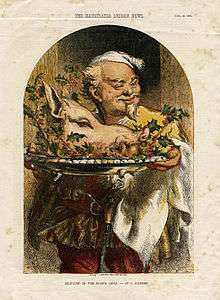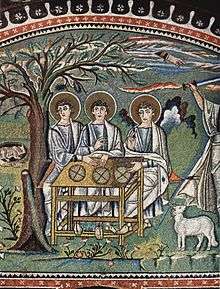Hospitality


The trestle (also tressle, tressel and threstle) in heraldry is also used to mean hospitality, as historically the trestle was a tripod used both as a stool and a table support at banquets.[3]
Hospitality refers to the relationship between a guest and a host, wherein the host receives the guest with goodwill, including the reception and entertainment of guests, visitors, or strangers. Louis, chevalier de Jaucourt describes hospitality in the Encyclopédie as the virtue of a great soul that cares for the whole universe through the ties of humanity.[4]
Hospitality ethics is a discipline that studies this usage of hospitality.
Etymology
Derives from the Latin hospes,[5] meaning "host", "guest", or "stranger". Hospes is formed from hostis, which means "stranger" or "enemy" (the latter being where terms like "hostile" derive). By metonymy the Latin word 'Hospital' means a guest-chamber, guest's lodging, an inn.[6] Hospes is thus the root for the English words host (where the p was dropped for convenience of pronunciation), hospitality, hospice, hostel and hotel.
Current usage
In the West today hospitality is rarely a matter of protection and survival and is more associated with etiquette and entertainment. However, it still involves showing respect for one's guests, providing for their needs, and treating them as equals. Cultures and subcultures vary in the extent to which one is expected to show hospitality to strangers, as opposed to personal friends or members of one's ingroup.
Global concepts
Ancient Greece
In Ancient Greece, hospitality was right, with the host being expected to make sure the needs of his guests were met. The ancient Greek term xenia, or theoxenia when a god was involved, expressed this ritualized guest-friendship relation. In Greek society a person's ability to abide by the laws of hospitality determined nobility and social standing. The Stoics regarded hospitality as a duty inspired by Zeus himself.[4]
India
In India hospitality is based on the principle Atithi Devo Bhava, meaning "the guest is God". This principle is shown in a number of stories where a guest is revealed to be a god who rewards the provider of hospitality. From this stems the Indian practice of graciousness towards guests at home and in all social situations.
Judaism

Judaism praises hospitality to strangers and guests based largely on the examples of Abraham and Lot in the Book of Genesis (Genesis 18:1–8 and 19:1–8). In Hebrew, the practice is called hachnasat orchim, or "welcoming guests". Besides other expectations, hosts are expected to provide nourishment, comfort, and entertainment for their guests,[7] and at the end of the visit, hosts customarily escort their guests out of their home, wishing them a safe journey.[8]
Pashtun
One of the main principles of Pashtunwali is Melmastia. This is the display of hospitality and profound respect to all visitors (regardless of race, religion, national affiliation or economic status) without any hope of remuneration or favour. Pashtuns will go to great lengths to show their hospitality.[9][10][11]
Celtic cultures
Celtic societies also valued the concept of hospitality, especially in terms of protection. A host who granted a person's request for refuge was expected not only to provide food and shelter for his/her guest, but to make sure they did not come to harm while under their care.[12]
Anthropology of Hospitality
Jacques Derrida offers a model to understand hospitality that divides unconditional hospitality from conditional hospitality. Over the centuries, philosophers have devoted considerable attention to the problem of hospitality.[13] However, hospitality offers a paradoxical situation (like language) since inclusion of those who are welcomed in the sacred law of hospitality implies others will be rejected. Julia Kristeva (1991) alerts readers to the dangers of “perverse hospitality”, which consists of taking advantage of the vulnerability of aliens to dispossess them.[14] Hospitality serves to reduce the tension in the process of host-guest encounters, producing a liminal zone that combines curiosity about others and fear of strangers.[15] In general terms, the meaning of hospitality centres on the belief that strangers should be assisted and protected while traveling.[16] However, not all voices are in agreement with this concept. Professor Anthony Pagden describes how the concept of hospitality was historically manipulated to legitimate the conquest of Americas by imposing the right of free transit, which was conducive to the formation of the modern nation-state. This suggests that hospitality is a political institution which can be ideologically deformed to oppress others.[17]
Over recent years and following Padgen, Maximiliano Korstanje argued that hospitality is a inter-tribal pact in which groups agree on self-defence in times of war and an exchange of goods and merchandise in peacetime. REF. Since the inception of the nation-state, the western concept of hospitality has been proposed as the main criteria for the free circulation and mobility of people and the main cultural value of modern capitalism Hospitality depends on the giving-while-receiving process which is the touchstone of social bonds. Hospitality and religion are also inextricably entwined. In the same way that the soul is protected by gods of the hereafter, strangers should be assisted while travelling. Failure to care for strangers is punished by the gods, who send calamities, earthquakes and other types of disaster. A lack of hospitality may be seen to predict the triumph of evil. In legends, myths and horror-movies, rogues often violate their guests, concealing their real intentions and then seizing them when sleeping. The guest-host meeting necessarily engenders high levels of vulnerability and risk, which are mitigated by the "sacred law of hospitality" where both agree not to attack the other while under the same roof. In view of the advance of secularization, the practice of unconditional hospitality has given way to a new sort of hospitality only for those who can pay for it.[18][19][20][21]
See also
| Wikiquote has quotations related to: Hospitality |
| Look up hospitality in Wiktionary, the free dictionary. |
- Backpacking (travel)
- CouchSurfing
- Hospitality management studies
- Hospitality services, modern-day hospitality networks
- Hotel manager
- Maître d'hôtel
- Reciprocal altruism
- Reciprocity (social psychology)
- Reciprocity (cultural anthropology)
References
- ↑ Wade, William Cecil (1898). The Symbolism of Heraldry. London: G. Redway. pp. 31, 67.
- ↑ Lower, Mark Anthony (1845). The Curiosities of Heraldry. London: J.R. Smith. p. 73.
- ↑ Guillim, John. "A Display of Heraldry" 1724
- 1 2 Jaucourt, Louis, chevalier de. "Hospitality." The Encyclopedia of Diderot & d'Alembert Collaborative Translation Project. Translated by Sophie Bourgault. Ann Arbor: Michigan Publishing, University of Michigan Library, 2013. Web. [fill in today's date in the form 18 Apr. 2009 and remove square brackets]. <http://hdl.handle.net/2027/spo.did2222.0002.761>. Trans. of "Hospitalité," Encyclopédie ou Dictionnaire raisonné des sciences, des arts et des métiers, vol. 8. Paris, 1765.
- ↑ C. Lewis, Elementary Latin Dictionary (Oxford Univ. Press, 2000), p. 371.
- ↑ Cassell's Latin Dictionary, revised by Marchant, J & Charles J., 260th. Thousand
- ↑ Kagan, Yisrael Meir (1888). Ahavath chesed : the Love of Kindness (2nd, rev. ed.). Warsaw: Feldheim. p. 284. ISBN 0873061675.
- ↑ Babylonian Talmud Sotah, 46B
- ↑ Banting, Erinn (2003). Afghanistan the People. Crabtree Publishing Company. p. 14. ISBN 0-7787-9335-4. Retrieved 2010-10-29.
- ↑ Schultheis, Rob (2008). Hunting Bin Laden: How Al-Qaeda Is Winning the War on Terror. New York: Skyhorse. p. 14. ISBN 978-1-60239-244-1.
- ↑ Hussain, Rizwan (2005). Pakistan and the Emergence of Islamic Militancy in Afghanistan. Aldershot: Ashgate. p. 221. ISBN 0-7546-4434-0.
- ↑ Charles MacKinnon, Scottish Highlanders (1984, Barnes & Noble Books); page 76
- ↑ Derrida, J. (2000). “Hospitality”. Angelaki: Journal of Theoretical Humanities,5(3), 3-18.
- ↑ Kristeva, J. (1991). Extranjeros para nosotros mismos, trad. de X. Gispert, Barcelona, Plaza & Janes Editores (Hombre y Sociedad).
- ↑ Graburn, N. H. (1983). “The anthropology of tourism”. Annals of tourism research, 10(1), 9-33.
- ↑ Lashley, C. (1995). Towards an understanding of employee empowerment in hospitality services. International Journal of Contemporary Hospitality Management, 7(1), 27-32.
- ↑ Pagden, A. (1995). Lords of all the worlds: ideologies of empire in Spain, Britain and France c. 1500-c. 1850. Yale University Press.
- ↑ Korstanje M E (2015) A Difficult World, examining the roots of Capitalism, New York, Nova
- ↑ Korstanje, M. E., & Olsen, D. H. (2011). The discourse of risk in horror movies post 9/11: hospitality and hostility in perspective. International Journal of Tourism Anthropology, 1(3-4), 304-317.
- ↑ Korstanje, M. E. (2011). The fear of traveling: a new perspective for tourism and hospitality. Anatolia, 22(2), 222-233.
- ↑ Korstanje, M. E., & Tarlow, P. (2012). Being lost: tourism, risk and vulnerability in the post-‘9/11’entertainment industry. Journal of Tourism and Cultural Change, 10(1), 22-33.
Further reading
- Danny Meyer (2006) Setting the Table : The Transforming Power of Hospitality in Business
- Christine Jaszay (2006). Ethical Decision-Making in the Hospitality Industry
- Karen Lieberman & Bruce Nissen (2006). Ethics in the Hospitality And Tourism Industry
- Rosaleen Duffy and Mick Smith. The Ethics of Tourism Development
- Conrad Lashley and Alison Morrison. In Search of Hospitality
- Hospitality: A Social Lens by Conrad Lashley and Alison Morrison
- The Great Good Place by Ray Oldenburg
- Customer Service and the Luxury Guest by Paul Ruffino
- Fustel de Coulanges. The Ancient City: Religion, Laws, and Institutions of Greece and Rome
- Bolchazy. Hospitality in Antiquity: Livy's Concept of Its Humanizing Force
- Jacques Derrida (2000). Of Hospitality. Trans. Rachel Bowlby. Stanford: Stanford University Press.
- James A. W. Heffernan (2014). Hospitality and Treachery in Western Literature. New Haven, CT: Yale University Press.
- Steve Reece (1993). The Stranger's Welcome: Oral Theory and the Aesthetics of the Homeric Hospitality Scene. Ann Arbor: The University of Michigan Press.
- Mireille Rosello (2001). Postcolonial Hospitality. The Immigrant as Guest. Stanford University Press.
- Clifford J. Routes (1999). Travel and Translation in the Late Twentieth Century. Cambridge, MA: Harvard University Press.
- John B. Switzer (2007). "Hospitality" in Encyclopedia of Love in World Religions. Santa Barbara, CA: ABC-CLIO.
- Immanuel Velikovsky (1982). Mankind in Amnesia. Garden City, New York: Doubleday.
- Christian Hänggi (2009). Hospitality in the Age of Media Representation. New York/Dresden: Atropos Press.
- Thomas Claviez, ed. (2013). The Conditions of Hospitality: Ethics, Politics, and Aesthetics on the Threshold of the Possible. Bronx: Fordham University Press.
- Korstanje M E (2016) Terrorism in the global village, how terrorism affects our daily lives. New York, Nova Science Pubs.
- Korstanje M E (2016) The Rise of Thana Capitalism and Tourism, Abingdon: Routledge.